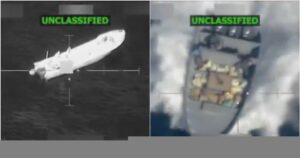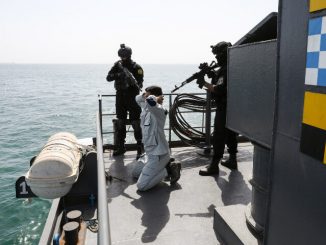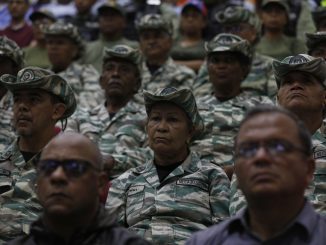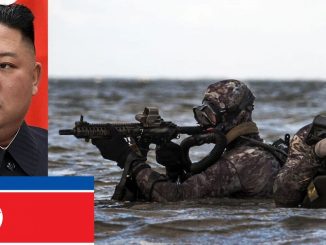
Published November 11, 2025
The United States has carried out two lethal strikes on vessels in international waters allegedly involved in drug trafficking, Secretary of War Pete Hegseth confirmed this week. The operations, which targeted vessels in a known narcotics trafficking corridor in the Eastern Pacific, reportedly resulted in the deaths of six individuals, with no casualties among U.S. forces.
According to Hegseth, intelligence identified the vessels as being operated by designated terrorist organizations engaged in narcotics smuggling. Each vessel had three personnel on board, all of whom were killed during the strikes. The operations are part of a broader U.S. counter-narcotics effort, with a total of 19 lethal strikes carried out against similar targets under the current administration.
Yesterday, at the direction of President Trump, two lethal kinetic strikes were conducted on two vessels operated by Designated Terrorist Organizations.
These vessels were known by our intelligence to be associated with illicit narcotics smuggling, were carrying narcotics, and… pic.twitter.com/ocUoGzwwDO
— Secretary of War Pete Hegseth (@SecWar) November 10, 2025
The secretary framed the strikes as necessary to protect American communities from a stream of deadly drugs pouring into the United Sta
The strikes were coordinated through a joint task force in the U.S. Southern Command area, combining air, maritime, and special operations to disrupt the operations of drug cartels and enhance homeland security. Hegseth emphasized that these measures are intended to stop the flow of illicit narcotics and protect the American public.
Hegseth’s statements were echoed on social media, highlighting the administration’s commitment to countering cartel operations abroad. While the operations were conducted in international waters, the U.S. government maintains that they were carried out under lawful intelligence and operational oversight.
Observers note that these strikes represent a significant escalation in U.S. intervention against transnational drug trafficking operations. The targeting of vessels in international waters raises questions regarding jurisdiction and compliance with international law, though the U.S. maintains that the strikes were necessary to prevent harm to domestic populations.
 Implications
Implications
⚠️ Strategic & Operational Implications
-
Escalation of U.S. Counter-Narcotics Operations
-
The strikes show a more aggressive posture by the U.S. in targeting drug trafficking organizations abroad, particularly in international waters.
-
This could signal an expansion of U.S. military and intelligence involvement in regions traditionally handled by law enforcement or regional authorities.
-
-
Maritime & International Security Considerations
-
Conducting strikes in international waters raises potential questions under international law, including the UN Convention on the Law of the Sea (UNCLOS).
-
Other nations in the region may monitor U.S. operations closely, potentially affecting diplomatic and military relations.
-
-
Counter-Terrorism Framing
-
Labeling cartel groups as “designated terrorist organizations” allows the U.S. to apply counter-terrorism legal frameworks.
-
This could create a precedent for future operations against transnational criminal networks, potentially blurring lines between terrorism and organized crime.
-
⚖️ Legal & Political Implications
-
Domestic Oversight
-
Congressional oversight may be triggered regarding the legality, intelligence basis, and rules of engagement for lethal strikes in international waters.
-
Accountability and reporting requirements could become a subject of debate.
-
-
International Relations
-
Countries with interests in the Eastern Pacific or nearby regions may demand explanations, potentially leading to diplomatic negotiations or tensions.
-
Allies and international bodies may scrutinize U.S. adherence to maritime law.
-
💰 Economic & Trade Implications
-
Disrupting cartel operations could indirectly impact illicit finance flows, which sometimes intersect with trade, money laundering, and even regional markets.
-
While primarily a security measure, these operations can affect regional stability, which can have knock-on effects on shipping, insurance, and commercial activity in affected waters.
👁 Broader Implications for U.S. Policy
-
Reinforces the administration’s commitment to “protecting the homeland” through offensive operations abroad.
-
May signal to adversaries and criminal networks that U.S. forces are willing to act decisively outside U.S. territory.
-
Could influence future military strategy, counter-narcotics policy, and the role of U.S. forces in international waters.
 Overall Takeaway:
Overall Takeaway:
The confirmed strikes on two alleged drug trafficking vessels highlight the U.S. government’s ongoing efforts to combat transnational narcotics operations. Conducted in international waters and targeting groups classified as terrorist organizations, the operations demonstrate a combination of military precision and intelligence-led planning. While successful in eliminating the immediate threats with no U.S. casualties reported, the strikes carry strategic, legal, and diplomatic implications that underscore the complex nature of counter-narcotics and counter-terrorism operations in international domains.
SOURCES: THE GATEWAY PUNDIT – Secretary of War Pete Hegseth Confirms Two Deadly Strikes on Narco-Terrorist Vessels — Six Cartel Operatives Dead
FOX NEWS – US carries out more ‘lethal’ strikes on alleged drug boats in international waters, Secretary Hegseth says





Be the first to comment